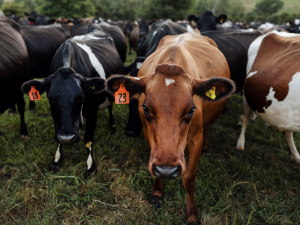NZ Catchment Groups Thrive with ‘Source to Sea’ Approach
The most successful catchment groups in NZ are those that have 'a source to sea' approach.
 A review into the Mycoplasma bovis infection at Wakanui in Mid- Canterbury, shows the Ministry for Primary Industries (MPI) took the appropriate steps to remove infection in the area.
A review into the Mycoplasma bovis infection at Wakanui in Mid- Canterbury, shows the Ministry for Primary Industries (MPI) took the appropriate steps to remove infection in the area.
An independent review into the Mycoplasma bovis (M.bovis) infection at Wakanui in Mid-Canterbury, shows the Ministry for Primary Industries (MPI) took the appropriate steps to remove infection in the area.
The review was commissioned by MPI, DairyNZ and B+LNZ last year after it became apparent that infection was circulating in a small geographical area despite the use of disease control measures, which have proven successful in other areas around NZ.
The review, carried out by epidemiologist Dr John Happold, could not confirm the sources of infection in Wakanui but says that the area has been unique to other parts of NZ which have experienced the M. bovis infection.
Happold believes the unusually high amount of infection on the Five Star Beef feedlot could have allowed for airborne transmission – something that is highly unlikely to have occurred in other areas of NZ.
MPI’s M Bovis programme director, Simon Andrews says Wakanui had a large, concentrated, and dynamic population of infected animals within the local feedlot.
He says there was also a small cluster of other confirmed properties, most of which have paddocks adjacent to the feedlot.
He says the reviewer was not able to determine the transmission routes occurring in Wakanui with any certainty and says it’s possible these may never be known.
“What we do know is, eradication is not dependent on knowing the transmission route. What is important is that we remove the infection from the area which is exactly what we’re doing.“
As part of the review, Happold also looked at a range of transmission routes including mechanical vectors such as birds and flies, manure, effluent, and groundwater. He concluded infection is unlikely to have occurred via these routes. In his report, Happold supported the depopulation plan for Five Star Beef and the use of a Controlled Area Notice (CAN).
Andrew says the eradication effort continues to make good progress and that the high-risk area of the CAN is now free of cattle and the CAN is on track to be lifted in mid- March.
He says it’s expected all current Confirmed Properties are likely to be cleared within the first half of this year.
“While the job is far from over, we are as close to moving to the next phase of the eradication as we have ever been and the collective effort from farmers, industry and Programme staff has helped us get to where we are today,” he says.
The Mycoplasma bovis Eradication Programme began in May 2018 and is jointly funded by Government (68%) and DairyNZ and Beef + Lamb New Zealand (32%).
Just over 3 million tests have been completed, $234 million has been paid out in 2838 claims and 180,872 cows have been culled.
Voting has started for the renewal of DairyNZ's milksolids levy.
The most successful catchment groups in NZ are those that have 'a source to sea' approach.
Associate Agriculture Minister and Manawatu dairy farmer Andrew Hoggard says the free trade agreement (FTA) negotiated with India is not a bad deal and his party, Act, will support it when it goes before Parliament.
Newly released data from Environment Canterbury (ECan) Farm Environment Plan (FEP) audits are showing a dramatic lift in environmental performance across the region.
A solid recovery of global dairy prices this year makes a $9.50/kgMS milk price almost a shoo-in for this season.
As New Zealand marks the United Nations’ International Year of the Woman Farmer 2026 (IYWF 2026), industry leaders are challenging the misconception that women only support farming.
OPINION: Fonterra may be on the verge of selling its consumer business in New Zealand, but the co-operative is not…
OPINION: What does the birth rate in China have to do with stock trading? Just ask a2 Milk Company.